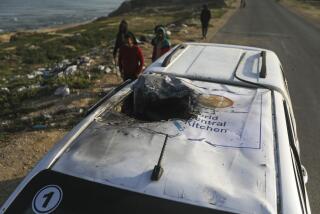Egyptian Who Killed 7 Israelis Gets Life Term
- Share via
CAIRO — An Egyptian military court, winding up a monthlong trial that became a cause celebre for anti-government groups opposed to closer relations with Israel, sentenced an Egyptian policeman Saturday to life imprisonment at hard labor for the murder of seven Israeli tourists in the Sinai Peninsula.
Sgt. Suleiman Khater, dubbed the “Hero of Sinai” by the newspapers of Egypt’s political opposition, was convicted of unpremeditated murder in the Oct. 5 slayings in the Sinai border town of Ras Burka, his lawyer said.
Of Political Significance
The closed trial, conducted in Suez City, was considered politically significant because of its likely influence on talks over a border dispute that has delayed the restoration of normal relations between Egypt and Israel.
After months of negotiations, an agreement to resolve the dispute over the Sinai beachfront resort of Taba now appears nearly complete, awaiting only final approval by the Israeli Cabinet.
Diplomatic sources said the conviction and sentencing of Khater ought to help Israeli Prime Minister Shimon Peres overcome opposition to a settlement of the Taba dispute from Foreign Minister Yitzak Shamir and other members of his right-wing Likud Bloc, a partner in Peres’ coalition government.
In practice, an Egyptian sentence of life imprisonment amounts to 25 years, and good behavior would reduce that term by an additional six years.
‘The Fullest Respect’
Asked to comment on the verdict, Israel’s ambassador to Cairo, Moshe Sasson, noted that the sentence is provisional pending confirmation by a senior military review board. He said Israel will withhold official reaction until then. But, Sasson said, “speaking personally, I have the fullest respect for the court ruling,” and he added, “I have every confidence in Egyptian justice.”
The ruling is likely to stir further political controversy in Egypt, however. Since the trial began in mid-November, opposition parties and their newspapers have been waging an increasingly vituperative campaign for Khater’s acquittal.
Contrary to all eyewitness and prosecution accounts of the incident, the opposition press has variously charged that the Israelis were spies or that they goaded Khater into opening fire on them by disrobing in public and by tearing down and spitting upon an Egyptian flag. These accounts, which portrayed Khater as a patriot defending his country’s honor, have omitted mention of the fact that four of the slain Israelis were children.
Anti-Israeli Feelings
The vocal opposition press campaign has helped to fuel anti-Israeli sentiment at a delicate time in the Taba negotiations and has inspired several violent demonstrations against the government of President Hosni Mubarak over the past week.
At least 31 students were arrested and several score injured in four days of pro-Khater demonstrations at Zagazig University in the Nile Delta last week.
On Friday, police in Cairo broke up an attempted sit-in at the Al Azhar mosque by members of the tiny Socialist Labor Party. Young street toughs employed by the Interior Ministry dragged about 60 people from the mosque after morning prayers, muzzling and hitting those who tried to shout slogans in support of Khater as they were dragged away to police vans.
“If Mubarak kills Khater, his fate will be the same as the dog Sadat’s,” one demonstrator said, referring to the assassination of Mubarak’s predecessor, President Anwar Sadat, by Muslim extremists in October, 1981.
Riot Police Deployed
Riot police were deployed in force around university campuses in Cairo on Saturday, when the verdict was announced, but no further violence was reported.
Khater, 24, was tried before a military tribunal despite the fact that, as a policeman, his case would normally come under civilian jurisdiction. The Socialist Labor Party and other opposition groups had asked that his case be transferred to a civilian court, but the government opted for the expediency and secrecy of a military trial because of the sensitivity of the case, analysts said.
Under the court-martial system, no appeal is allowed, although Khater’s attorneys can ask for clemency.
Khater’s chief attorney, Emad Sobki, told reporters that the prosecution asked for the death sentence on the basis of a legal technicality. Although the charge of murder without premeditation carries a maximum penalty of life imprisonment, the Egyptian penal code allows for the death sentence if unpremeditated murder is coupled with or followed by another crime.
Another Crime Cited
In this case, the prosecution argued that an additional charge of attempted murder should apply because the three surviving Israelis were wounded during Khater’s shooting spree.
Diplomatic sources expressed the belief that the prosecution’s request for the death penalty was meant to help deflect criticism of the final verdict of life imprisonment by portraying it as comparatively lenient.
An official Egyptian statement issued at the time of the incident said Khater went berserk. The defense based its case on a claim of temporary insanity, noting that the shooting came only five days after Israeli planes bombed the Tunisian headquarters of the Palestine Liberation Organization, killing more than 70 people, including a number of Tunisian civilians.
Suspension of Talks
That incident provoked Egyptian condemnation and led to the temporary suspension of the Taba talks.
More to Read
Sign up for Essential California
The most important California stories and recommendations in your inbox every morning.
You may occasionally receive promotional content from the Los Angeles Times.













